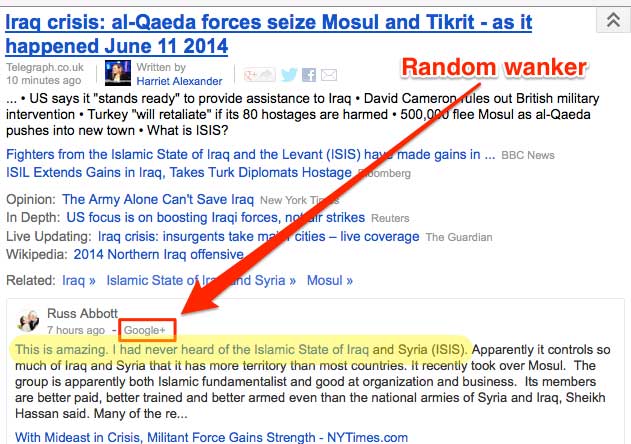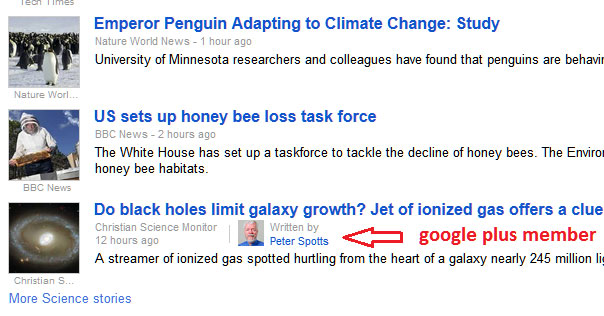Google News was never a great aggregator but it's preferable to, say, the agenda-ridden New York Times for a quick headline-overview. When the Times announced a few years back, for example, that Eliot Spitzer had "ties to organized crime" instead of reporting that he had visited a hooker, with Google News you could see at a glance how other papers were spinning the same factoid.
Lately, though, Google isn't even subtle about using News as recruiting tool for its Facebook-wannabe social media platform, Google Plus. Lambert at the Corrente blog made this screenshot showing how a random dude who happens to have a G+ account has his post mingled into search results with legacy news outlets:

Another recent change: for stories written by journalists who are G+ members, that correspondent's name appears below the headline with a thumbnail photo and hyperlink to his/her G+ page. There is also a sleekly designed pop-up associated with the hyperlink. Whereas a story written by a non-G+ member has no associated byline (and therefore no link or pop-up) in the search results. Just a little incentive for journalists to join the G+ family.

Google once billed itself as some kind of objective arbiter of web content. Not that any of us believed that, but placing its G+ thumb on the news-gathering scale is not all that different from having internet service providers creating neutrality-defying fast lanes. A minor complaint compared to other egregious practices but worth noting.
Update: As to why the random Google+ user is appearing in search results, the "chief architect of Google+", Yonatan Zunger, responded here. (Hat tip Jules Laplace for following up on this.) The G+ user's post is a comment to the preceding news items, not a news item itself. Perhaps that should have been apparent, because it's indented and put in a box (I see that now, sort of) but Google provides no other warning that it's a random dude comment.
Zunger sidesteps the specific criticism of why a G+ user with nothing to say and very few "pluses" is junking up front page search results. I had suggested it was a rather over-large carrot to entice people to sign up for Google+, which hasn't exactly been setting the world ablaze vis a vis Facebook. Zunger's corporate happy speak position is that Google is "providing people a means to converse about the news" and seeks "to invite them into the discussion." Then why not embed comments from, say, the New York Times? Laplace asked. Google can't do that for "legal and product reasons," Zunger says. OK, sorry you couldn't get that worked out, but aren't you now creating the appearance of giving preferential treatment to your unwashed users at the expense of a credible news source? I'd like to ask -- but he's not going to go there.
